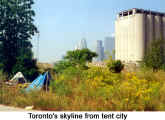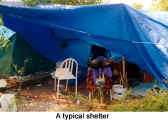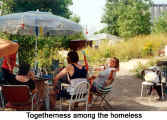
Homeless or Hopeless?
These are the images we associate with the homeless. We have them neatly labelled, compartmentalized into the above categories, worthless of our consideration. When we encounter any one of them we most often are embarrassed, donít even look at them, keep on walking and sometimes shrug our shoulders or automatically say no. Frequently we are annoyed at the constant pleads for help. We complain to store owners and managements, inquire if something can be done so we donít have to run the gauntlet every time we go shopping or to a concert. It is uncomfortable to look at these people, even if they offer an unwanted service like opening doors or washing windshields. We have steeled ourselves against them.
Of course we ask questions like: Why donít they get a job? Why donít the authorities do something? As long as we donít have to look at them our world is fine and we do not have to feel guilty about our prosperity. Or is that the real reason for our discomfort?
Or is it because somewhere deep down we cannot even imagine that we ourselves could be in those homeless, jobless shoes or what it would be like to be in such a situation. We of course would never let that happen; in fact, it could never happen to us! There is no such thing as homelessness and unemployment in this country! We are number one on everyoneís list of preferred countries to live in. That is why we are here and not somewhere else.
We have come to the conclusion that we cannot help these people and sometimes that is true. Our governments run many different programs to get these people off the street, off drugs and alcohol. There are all sorts of charities, church groups and volunteer organisations dealing with this problem, and without them their plight would be even more visible to us.
 Talking
to individuals that make it their business to alleviate the situation we can
find out that indeed there are quite a few hopeless cases. These are people
who have been out on the street for a long time, and the longer they are
there the less are their chances to find their way back into the mainstream
of society. They follow a pattern of self-destruction, have lost the ability
to reason or apply discipline to their existence. We keep them alive,
barely, with handouts of necessities such as water, basic foods, toothpaste
and munchies. We offer them soup kitchens and overflowing shelters in the
winter. We do not want to give them money because we know it will be turned
not into food but drugs and alcohol.
Talking
to individuals that make it their business to alleviate the situation we can
find out that indeed there are quite a few hopeless cases. These are people
who have been out on the street for a long time, and the longer they are
there the less are their chances to find their way back into the mainstream
of society. They follow a pattern of self-destruction, have lost the ability
to reason or apply discipline to their existence. We keep them alive,
barely, with handouts of necessities such as water, basic foods, toothpaste
and munchies. We offer them soup kitchens and overflowing shelters in the
winter. We do not want to give them money because we know it will be turned
not into food but drugs and alcohol.
 The
brighter ones participate in programmes that could get them back on their
feet if they really want to. And some actually make it if not too much time
goes by before they are offered a job they can stick to and find an
affordable place to live. We know that there is a shortage of inexpensive
living quarters and the ones that exist are often riddled with severe social
problems. There are things done to help these people, but for a lot of them
it is too late, it seems.
The
brighter ones participate in programmes that could get them back on their
feet if they really want to. And some actually make it if not too much time
goes by before they are offered a job they can stick to and find an
affordable place to live. We know that there is a shortage of inexpensive
living quarters and the ones that exist are often riddled with severe social
problems. There are things done to help these people, but for a lot of them
it is too late, it seems.
 I
met some of such hopeless people in Tent City at the foot of Jarvis Street:
a 35 year old woman looking more like 55 with missing teeth, pregnant with
her 4th child while she is on crack and alcohol. She says of
herself that she is a drugaholic and cannot change. She is scared that the
authorities will take her child, which of course will be born any day now as
addicted as she is. This fear makes her drink so she does not have to think
about it. She is incapable to take responsibility for herself or her unborn
child. She lives with someone down there under a tarp with a view of the
harbour.
I
met some of such hopeless people in Tent City at the foot of Jarvis Street:
a 35 year old woman looking more like 55 with missing teeth, pregnant with
her 4th child while she is on crack and alcohol. She says of
herself that she is a drugaholic and cannot change. She is scared that the
authorities will take her child, which of course will be born any day now as
addicted as she is. This fear makes her drink so she does not have to think
about it. She is incapable to take responsibility for herself or her unborn
child. She lives with someone down there under a tarp with a view of the
harbour.
It is heartbreaking to see the attempts of some to carve out a personal space marked by 2 by 4s on the ground, a threadbare throwaway carpet on the grass, an old coffee table, rickety chair, mattress and some personal items thrown everywhere.
 And
then I met "Otto", a handsome German who has lived for 19 years in
Canada. He has a respectable resume and even though he lives there with the
other homeless, his case is far from hopeless. He does not take a handout,
is not on social assistance. He lives down there because he wants to make it
on his own. And I believe he will!
And
then I met "Otto", a handsome German who has lived for 19 years in
Canada. He has a respectable resume and even though he lives there with the
other homeless, his case is far from hopeless. He does not take a handout,
is not on social assistance. He lives down there because he wants to make it
on his own. And I believe he will!
How did he end up there?
The story starts in East Germany, before the fall of the wall. He was in the military assigned to border duty. As we know many citizens of East Germany tried to cross the border to flee to the West and the freedom that awaited them there. The GDR prohibited this and demanded that the border personal shoot any escapees. Our "Otto" refused these orders. He was not willing to shoot his own people. For his refusal he went to jail, and when he was found guilty again and they were about to pick him up for the second time he fled via Bulgaria to Austria and with the help of Geneva Convention regulations was allowed to come to Canada as a regular landed immigrant. Here he found gainful employment, a wife who he loved dearly, built his own company and had lots of freedom to create a future. They lived in a penthouse, went on vacations, had friends and everything else a person could want. But then his wife suddenly died only in her 30ies of an aneurysm. And Otto lost it or as he puts it: "I fell off the wagon".
Not only did he lose his wife, he also lost his drivers licence and his job. The system caught him and rehabilitation was possible. He also learned new skills and is capable of understanding and helping others in hard times.
Some month ago he decided to build this little house in Tent City. It is not like the other very temporary shelters down there. It has 4 walls, windows and a door with a lock, out of necessity. The floor is made of link bricks which he scrounged somewhere. He built a good bed, has shelves with books and other useful items. Under a gazebo-like veranda is a table with a bench and a couple of odd chairs. Next to his abode he runs high up on a flagpole, what else, the German flag. Now he is pondering how to stay there during the winter. A generator, so he can put some electric heat in there, is on the horizon and insulation will be necessary. He needs a buddy down there, because when he his gone out to work other homeless occasionally get too rambunctious and cause damage. A shelter is almost ready for someone to move in right next to him. Two is better than one. They can take shifts in guarding the "property". There are not many reliable people to choose from. But he will make out ok; he is determined to make it back to Germany, where his parents, now old, live in Bad Kreuznach. "Otto" is not so young anymore either. But he looks a lot younger than his 50 years, is trim, healthy, fit and, most important, clean in every sense.
We wish him good luck and will give you an update occasionally. If you would like to hire him, he is currently renovating someoneís basement, call us (652-1332), and we give you his real name and tell you where you can reach him.
But this story is not just about the many that donít make it and the few that do. It is about the effort to not let people go down the tubes. It is about children, youngster, that felt for one reason or other that they had to leave home, go to the big city and then get lost in the streets. Operation Go Home is a place where everyone involved has only one goal: Get kids back to where they belong, and that is definitely not out on the streets. 1000,000 youth live out there in Canada! Think about it, 100thousand children! We donít know what happened, why they ran away, but the reasons are as many as there are children.
Perhaps you recall Rachel, a young girl I picked up a few years ago in the fall. I told you her story. She was of Austrian heritage and lived in a small Ontario town. Her parents and grandparents belonged to the clergy and became aware of her one mistake: Under peer pressure she tried some drugs, but decided that she did not like it. Unfortunately no one believed or trusted her and she was virtually held prisoner at home for a very long time. At the first opportunity she bolted, never looking back. She was determined to make it, and I believe she did, but at what prize?
Operation Go Home has many success stories to report. Just recently a young woman reported that she had been accepted at UFT. She was just like Rachel, had run away from home, allowed OGH to intervene and got back together with her family. And then I heard about someone who needed to go back all the way to Hungary. Yes, we have runaways from foreign shoes here.
Since children represent our collective future doesnít it stand to reason that we should help them straighten themselves out, do what is necessary to reunite them with their families if at all possible? OGH does this with much patience and skill. This organisation is 100% community funded and has never received even a cent from the government, which spends huge amounts of money on programmes that do not really work very well for a lot of people as I could see for myself at Tent City and everywhere else I go in this town.
As a community we too have a certain responsibility to help. There is a big ad in this paper for a fun filled fundraiser organized largely by Gabi Schick. Please open your hearts and join in. Come help us celebrate the most precious thing there is: Life, the life of children and youths!
I really hope to see you there.
Sybille Forster-Rentmeister
Comments to: sfr@echoworld.com

